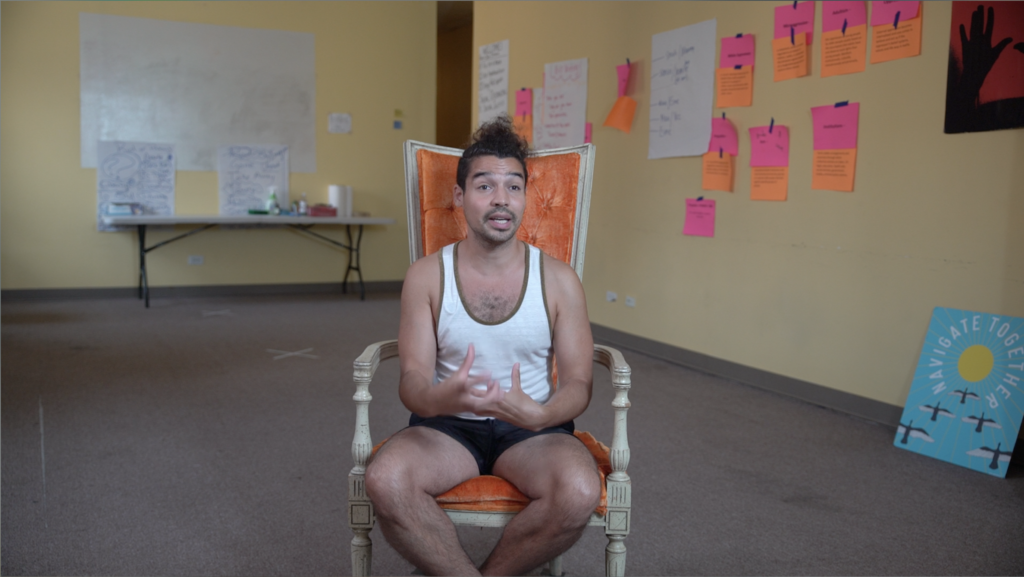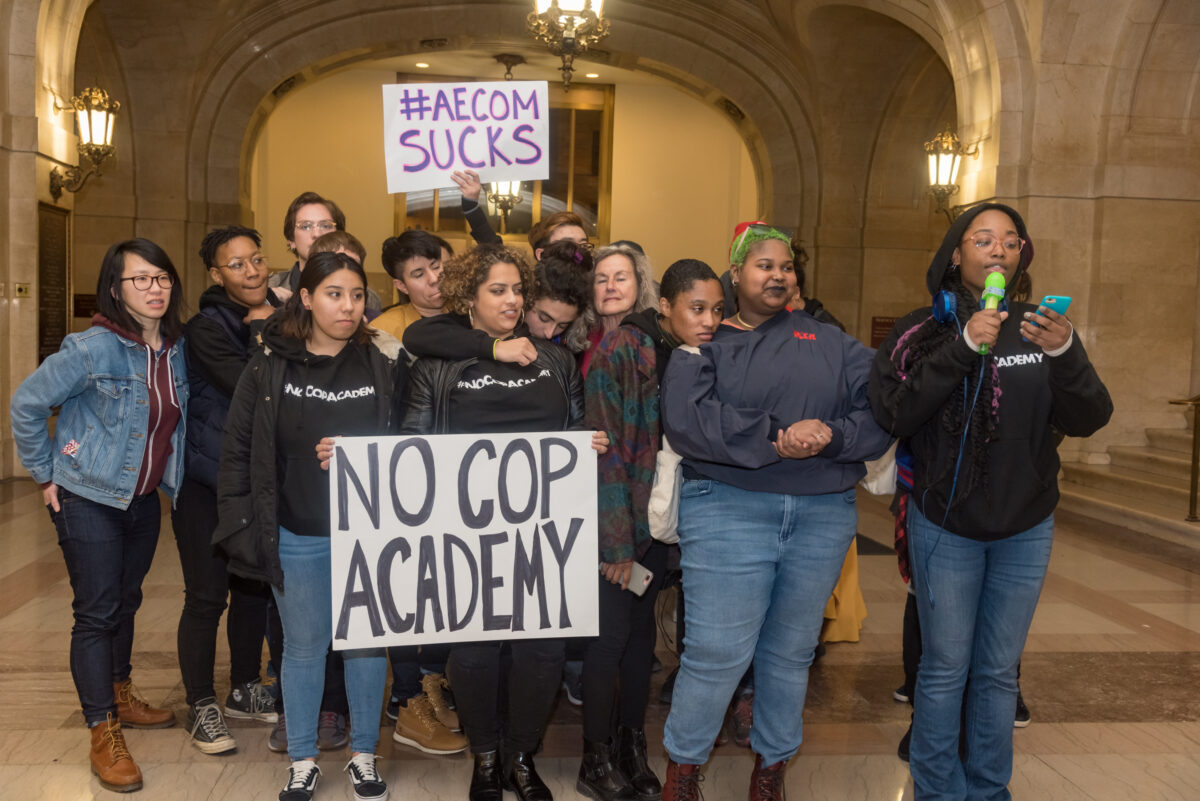How will you show up the next time your municipality tries to ram through a proposal without community input under the cover of darkness?” asked an unnamed narrator as No Cop Academy: The Documentary concluded. “Will you boldly say no in the same way that No Cop Academy did? Will you organize your communities to fight?”
When the credits rolled after a screening of the documentary on a chilly Monday evening in October, the audience gave a standing ovation and burst into a spontaneous cheer. Cries of “We love you! We, we, love you!” resounded through the auditorium at Malcolm X College.
Directed by Caullen Hudson, a Chicago-based filmmaker and community organizer, and produced by Soapbox, his local production company, the film shows how a small but committed core of organizers steadily built support for their cause.
“We found it important and necessary to not only capture what happened during the eighteen-month campaign but put it in political and emotional context,” Hudson said.
After the screening, Destiny Harris, one of the organizers featured in the film, ran up to the podium to lead an impromptu repeat-after-me: “Set My People Free!” “I’m Letting My People Know!” “I Love You Like You Were Me!” All the infectious youthful energy and righteous anger depicted in the film was encapsulated in that very moment.
No Cop Academy chronicles the campaign that tried, but ultimately failed, to shelve former Mayor Rahm Emanuel’s controversial plan to build a multimillion-dollar police and fire academy on the West Side. On the border of the Humboldt and West Garfield Park neighborhoods, the academy opened its doors in January. Though the original price tag of the academy was projected at $95 million, which was cited in the campaign’s principal rallying cry, “No Cop Academy, 95 million for community,” the final tally ballooned to $128 million after an additional $33 million was designated for a mock neighborhood.
“I think this is a win-win for the city of Chicago,” Ald. Emma Mitts (37th) told Block Club Chicago at the academy’s ribbon-cutting ceremony. “Took a lot of bruises, but they were worth it.”
Through interviews with the tight-knit group of organizers and up-close, on-the-ground footage from numerous demonstrations they led in and around City Hall, the film portrays how a movement largely led and composed of Black and brown teenagers went to bat against some of the most powerful figures in Chicago—the mayor, City Council, and the police—and shamed them for supporting a project that the majority of people in the communities surrounding the development had not heard of and did not support once they did.

The film documents how organizers cannily deployed a creative array of nonviolent tactics to slow down and disrupt the process, from getting a sitting alderperson to postpone a key hearing so that organizers had time to rally their supporters to City Hall in protest, to directly confronting Emanuel and Mitts at restaurants and event halls.
Although the campaign mostly spanned the years 2017 to 2019, from when Emanuel first put forward a plan for the academy to when City Council ultimately approved funding for it, the film traces its genesis to Emanuel’s decision more than a decade ago to shut down six mental health clinics and over fifty schools across many of the city’s already disinvested Black and brown neighborhoods.
When she joined the #NoCopAcademy campaign, Harris was a teenager living in West Garfield Park and attending Whitney Young High School. The campaign organizers invited young people like her to an art-making event held at a school on the West Side. Many quickly became friends over their shared beliefs. They grew even closer at a retreat at the Highlander Research and Education Center in Tennessee, famed as a hub for civil rights, labor, and environmental activists to gather and strategize.
“The first time I ever went outside of the city of Chicago was through No Cop Academy on the Tennessee trip [to Highlander],” said Yolanda J., another youth organizer on the panel. “I got to be with people like me, people that thought the same, people that were just as radicalized, but our radicalized thoughts were just normal.”
Several turned into committed police abolitionists. For Jennifer Nava and the other panelists, that means making investments in public housing, mental health facilities, and education, which they say will truly help people stay safe, using funds from the $1.78 billion Chicago Police Department (CPD) budget.
“When we break down those institutions, we plant seeds that grow and flourish into things that nurture us,” Nava said. “And that [brings] life in abundance and love and joy.”
Despite frustration at the new police academy opening this year, none of the organizers who spoke on the panel recalled the campaign as a failure. Instead, they viewed it as a learning experience to draw from for subsequent campaigns, such as the one that pressured Chicago Public Schools (CPS) to cut its contract with CPD and allow local school councils to remove their school resource officers, police assigned to patrol schools.
“A lot of people who organized with No Cop Academy went on to organize with Cops Out of CPS,” Harris said. “That shit we actually won.”
The organizers also discovered the power of their own voices, regardless of their youth.
“One of the biggest things that I learned through being a part of the campaign is that one, they scared of us, and two, we have hella power, bro, like…we were able to get over 100 organizations to back up us young people,” Harris said. “Age is not a factor. These aldermen, they love to be like, ‘Oh, they just some young kids, they don’t know what they talking about’… like we know, like we talked to the people of the community, y’all didn’t.”
On the campaign trail, former Mayor Lori Lightfoot opposed the proposal on technical grounds, saying that more community engagement was needed, but ultimately agreed that a new training facility was required. Her decision to build upon Emanuel’s plan once elected was one of the many reasons organizers threw their support behind outsider mayoral candidate Brandon Johnson in 2023, who went on to defeat her and win the run-off election against Paul Vallas.
Ultimately, the youth organizers see the #NoCopAcademy campaign as a wellspring of inspiration from which they and others will draw for years to come.
“To see what’s going on now, with like Stop Cop City [in Atlanta] and Defund [CPD], and just abolition in general, it’s just so beautiful,” Harris said.
For Hudson, the campaign helped illuminate how these organizing efforts can be personal, local, and global all at the same time. “The sooner we recognize these struggles as connected, the better we can collectively organize against these violent projects and for life-affirming institutions and economies,” he said.
In 2021, local activists and ecologists in Atlanta uncovered a plan by the Atlanta Police Federation to build a massive police training facility in southwest Dekalb County on the site of an old prison farm. To try to halt this development, they have staged a series of mass demonstrations, protested at the Atlanta City Council, and obtained 100,000 petition signatures calling for a ballot referendum on whether construction should proceed.
Activists in Atlanta remain hopeful they can still stop the development with a vote, and the fight in Chicago imparts that, even if their efforts fail, the campaign would not have been in vain.
“All of this is part of a story of how do you lose, and how do you lose in ways that are actually really powerful,” said Page May, founder of Assata’s Daughters, towards the end of the documentary. “One step of that is that you ground yourself in history and recognize, like, we come from people who have lost over and over and over again, and yet somehow so many things [get] better.”
No Cop Academy: The Documentary was screened on Nov. 5 and will appear again Nov. 12 at the Gene Siskel Film Center, as an entry of the 29th annual Black Harvest Film Festival. Tickets are available here: https://www.siskelfilmcenter.org/no-cop-academy.
Max Blaisdell is a fellow with the Invisible Institute and a staff writer for the Hyde Park Herald.

